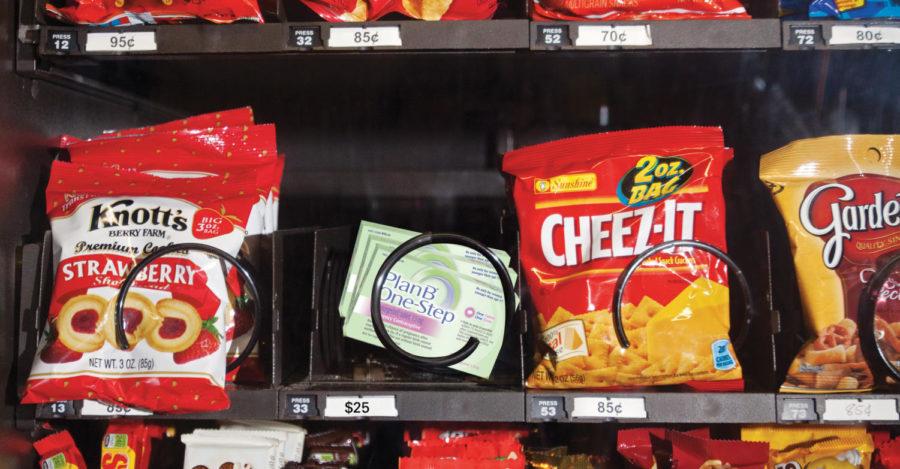Plan B: a new vending machine option?
Photo illustration: Kelsey Kremer/Iowa State Daily
Shippensburg University, in Pennsylvania, has garnered national attention after its decision to implement vending machines that give out Plan B contraceptives to students.
February 22, 2012
Coin-operated vending machines have been around since the late 1880s and have commonly sold snacks and beverages. But recently, vending machine contents have expanded further by dispensing an over-the-counter drug at Shippensburg University in Pennsylvania: Plan B One-Step.
Plan B, dubbed “the morning after” pill, provides emergency contraception to anyone over the age of 17. It must be taken within 72 hours of unprotected sex to be effective and is not to be used as birth control.
“The university is not encouraging anyone to be sexually active,” said Roger Serr, vice president for student affairs at Shippensburg. “That is a decision each student makes on his or her own.”
According to a report issued by Serr to students at Shippensburg, “several years ago, at the request of students, the university conducted a survey about health center services. 85 percent of the respondents supported making Plan B available. We value student input on matters that directly pertain to their health and safety so these results were an important part of the decision-making process.”
“If accessibility is the goal, this idea clearly takes large steps in that direction, but I think there are larger questions at stake here,” said Dakota Hoben, president of the Government of the Student Body.
Controversy surrounds the implementation of the machine and what it means for students. This has become normal for the centrally located school in Pennsylvania, but what if Iowa State adopted a similar machine?
“I would be against the vending machine [at Iowa State],” said Cheri Schmit, site manager at Medicap Pharmacy in Ames. “It is a good medication, but there should be a screening process that goes along with it.”
This is a common misconception. Peter Gigliotti, spokesman for Shippensburg University, said that the vending machine has been in place for about three years and has sold an estimated 350-400 pills. It dispenses the pill for $25 after the student enters the health center and provides identification.
“I would rather get it from a person, even though it may be embarrassing,” said Hailey Holland, a freshman in dietetics at Iowa State. “That way they can talk you through it.”
Holland recommended students get the pill from a pharmacy, even if a college does not have one. It may not be as convenient, but it will allow the students to obtain more information and ensure that the pill will not conflict with other medication that they are taking.
“I think a lot of Iowans have serious concerns with this form of distribution and the indifference being shown towards human life” Hoben said.
The Thielen Student Health Center at Iowa State carries Plan B in its pharmacy. Kara Shill, pharmacy technician at the health center described their over-the-counter practices as “pretty simple.” All a student needs to do is walk into the center, show their student ID, ask for the pill and pay the $25. Then a pharmacist will provide the student with the pill and instruction.
“Ours is identical,” Gigliotti said. “It’s only a dispensing difference.”
Gigliotti explained that Shippensburg University is a small school and does not have a pharmacy. This is why the vending machine was needed and implemented. Other small schools around the country may be looking into purchasing a Plan B vending machine of their own.
Iowa State currently has no plans to obtain a Plan B vending machine.
“I don’t think it would be a wise choice,” Shill said in regards to bringing the machine to Iowa State.

















